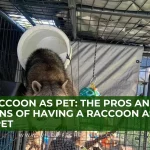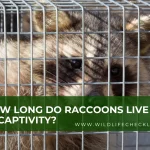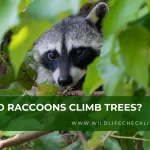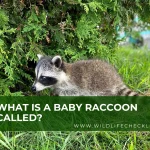What Do Raccoons Eat? An In-Depth Look At Their Diet

Every animal has a type of food they eat, which can be different from other animals, but what do raccoons eat? Raccoons (Procyon lotor) are omnivores, which means they eat plants and animals. Raccoons are mostly present in every state in the United States and thrive in various natural and urban environments.
Raccoons prefer to live near a body of water, where they can have access to aquatic feeding. But with the adaptation of raccoons, and their composition, what do raccoons eat?
Raccoons feed on plants and other animals, making them omnivore animals. The food raccoons can eat include fruits, berries, nuts, fish, frogs, mussels, crayfish, insects, turtles, mice, rabbits, muskrats, and bird eggs.
The preferred raccoon diet contains food in or near water, such as crayfish, frogs, fish, snails, and clams. They also enjoy insects, eggs, fruits, vegetables, nuts, and dead animals. Raccoons are not experts at hunting prey but occasionally catch a young mouse, rat, or squirrel.
Contents
- 1 Raccoon Eating Habits
- 2 Healthy And Unhealthy Foods For Raccoons
- 3 How Raccoon Diet Changes With Seasons
- 4 What Can Raccoons Not Eat?
- 5 Do Raccoons Eat Trash?
- 6 What Makes Raccoons Wash Their Food?
- 7 What Do Raccoons Eat In The Wild?
- 8 What Food Does A Raccoon Eat In Captivity?
- 9 What Do Raccoons Eat In Winter?
- 10 What Do Raccoons Eat In Summer?
- 11 What Does A Raccoon Eat In Urban Areas?
- 12 Conclusion
Raccoon Eating Habits
Raccoons are known to feed on plants and animals, and their diet can vary based on seasons and the available food. Raccoons can search for food in trash cans, gardens, and any other place where they can get food, especially in urban areas. Since they are nocturnal animals, they majorly forage for food at night.
They have a great sense of smell, which has helped them to detect the presence of food from a distance. They can climb trees to get fruits and nuts that they can feed on.
The baby raccoons, also known as kits, though born blind and helpless, for 16 weeks rely on their mother’s milk for survival before they start feeding on solid food. As they grow older, they will also begin to feed on the same food as the adult raccoons.
During the winter, raccoons store food in their dens for consumption because food is always scarce during the winter season.
Healthy And Unhealthy Foods For Raccoons
Raccoons can feed on anything they have available, and here are some healthy foods for this black-eyed animal.
- Worms, insects, and other invertebrates
- Eggs, chicken, and other poultry
- Crayfish
- Fish
- Seeds
- Dog food or omnivore-based dry food
- Nuts like groundnuts, peanuts, acorns, and beechnuts
- Fruits like apples, grapes, cherries, peaches, plums, and berries
- Vegetables like sweet potato, grape, cantaloupe, and carrots
As much as raccoons are omnivorous animals, there are some foods they can not eat, which are unhealthy to them, and they are:
- Chocolate, onions, raisins, and macadamia nuts. These are toxic foods to raccoons.
- Garlic and bread, these foods can upset their digestion.
- Foods like Coffee, cocoa, and candies can cause health problems for raccoons.
- Junk food, dairy products, or processed grains
How Raccoon Diet Changes With Seasons
As much as raccoons can eat a variety of food, their diet and type of food depend on seasonal changes. For instance, they feed on meat, fruits, nuts, acorns, walnuts, and sometimes even corn in the summer. Their favorite fruits include apples, grapes, cherries, peaches, plums, and berries.
During late autumn, raccoons need to build enough fat for the lean winter months because food becomes scarce this time, and feeding becomes challenging. This is one of the reasons you will see raccoons grow fatter in the autumn season, and they lose about half their weight during the spring.
Also, during the winter, raccoons feed on foods like acorns, fruits, insects, corn, small animals, and crippled waterfowl. They also take advantage of any local food source they find around. The black-eyed animal fights starvation in the winter by storing fats in the summer and autumn seasons.
In all, a raccoon can lose about 14 to 50 percent of its body weight during the winter season, though this depends on how severe the winger is, and the weight loss helps the raccoon to survive during summer.
What Can Raccoons Not Eat?
Raccoons can become ill by taking chocolate, onions, raisins, and macadamia nuts. Garlic and bread aren’t toxic but can upset a raccoon’s digestion, even Cocoa, Coffee, and candies can cause health problems in raccoons.
Also, milk cow’s milk, goat’s milk, soymilk, and most other milk products for humans will make the baby raccoon sick. Administering these products can lead to severe dehydration, malnutrition, and possibly even death. Use human infant formula only in an emergency.
Do Raccoons Eat Trash?
Raccoons are known to be “trash pandas” as they always love to get their hands on garbage. The truth is, they only do this because it is important and majorly for survival. They also do this because they face habitat destruction, and they need a place to survive, and this pushes the raccoons to scavenge in trash cans, gardens, and elsewhere to find food.
Unfortunately, they eat what they can find, which doesn’t typically offer the nutrition their body need. With all that they do with trash cans and garbage, they are clean animals, as they are known to always wash their foods with water before eating them.
What Makes Raccoons Wash Their Food?
Raccoons love to get their food wet to gather more sensory information, and making the food moist helps raccoons understand what they eat. In contrast to humans, who can use their eyesight to identify and know specific things, a raccoon relies on its touch to figure out certain information.
When a raccoon touches an object, it can gather nearly two-thirds of the sensory information of the object. A raccoon’s paws have four to five times more mechanoreceptors than most other mammals. As a result, raccoons can hold, interpret, and manipulate objects on the same level as humans and other intelligent primates.
Raccoons can be called bandits but of the animal world. They are experts in snatching food using their hand-like paws on wildlife. They never forget to dip and wash their food before munching on it!
What Do Raccoons Eat In The Wild?
Raccoons are known to be found in nearly every single state in the United States, and they almost exclusively do so in forests and woodland areas. Raccoons prefer to live in a tree cavity close to a pond, pond, or other body of water. The raccoon will move into any hollowed-out spot if no tree cavity is available. At night, they hunt along the water.
What Food Does A Raccoon Eat In Captivity?
Because pet owners have complete control over their pets’ food, offering only the healthiest food items to a pet raccoon should be easy. This cannot be easy with a pet raccoon since you’ll need to offer a wide variety of foods daily. The main feed should be a dry product for omnivorous animals, or you can give a dog kibble.
Just giving the dog food will not do, but providing an omnivore-based pellet or diet should be a great combination if there won’t be an additional item (which is recommended). Gut-loaded mealworms, crickets, earthworms, and other invertebrates can be given and doubled as enrichment if these prey items remain alive.
What Do Raccoons Eat In Winter?
When food becomes more scarce, this usually pushes desperate raccoons to be found wandering about towns looking in trash cans and garages for food. Again, as most things are safe, they will eat almost anything they can find.
What Do Raccoons Eat In Summer?
Raccoons go into “hibernation” during winter, but they are known to be very active during the summer. They ensure they hunt for food and avoid the pitfalls of predators, suburban landscapes, and cars. So during summer, raccoons feed on insects, mice, birds, small mammals, turtles, and birds. Raccoons, therefore, eat insects, mice, birds, small mammals, turtles, and birds throughout the summer.
As an omnivore, they tend to eat more plants as the weather becomes cooler. Also, they eat grains, wild fruit, and seeds. It is important to take raccoon removal seriously during summer because these creatures will be actively searching for food through garbage and trash cans. As the summer continues, they ensure they gather more fat for their body for the winter hibernation.
What Does A Raccoon Eat In Urban Areas?
Raccoons are regarded as opportunistic feeders and have adapted to live close to humans. The food raccoons can eat depends largely on where they live, so raccoons that live in residential areas can feed on food from trash cans, birds, gardens, and unattended food that belongs to the pets.
Once a raccoon finds a location with a food source, it will look for a secure place to build a den. Crawl spaces and attics provide all the requirements for an ideal raccoon den. With their sharp claws, raccoons can access different parts of your house.
Conclusion
Raccoons eat nearly all available foods, including nuts, fruit, insect, frogs, bird eggs, rodents, and dead animals.in cities and suburbs, raccoons eat food they find on the floor and sometimes break into the trash can. Raccoons can use their hands to open trash cans and containers in search of food.




